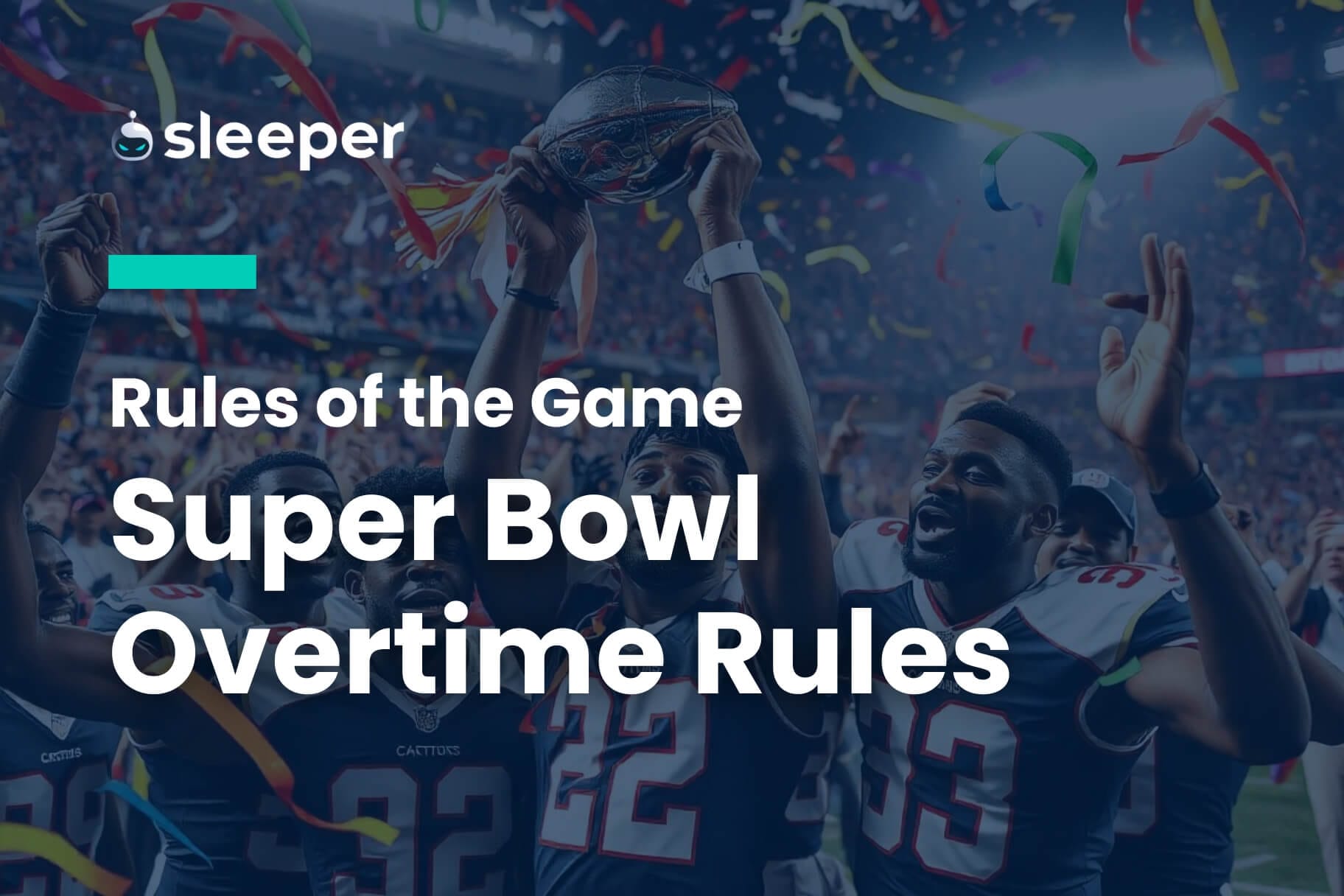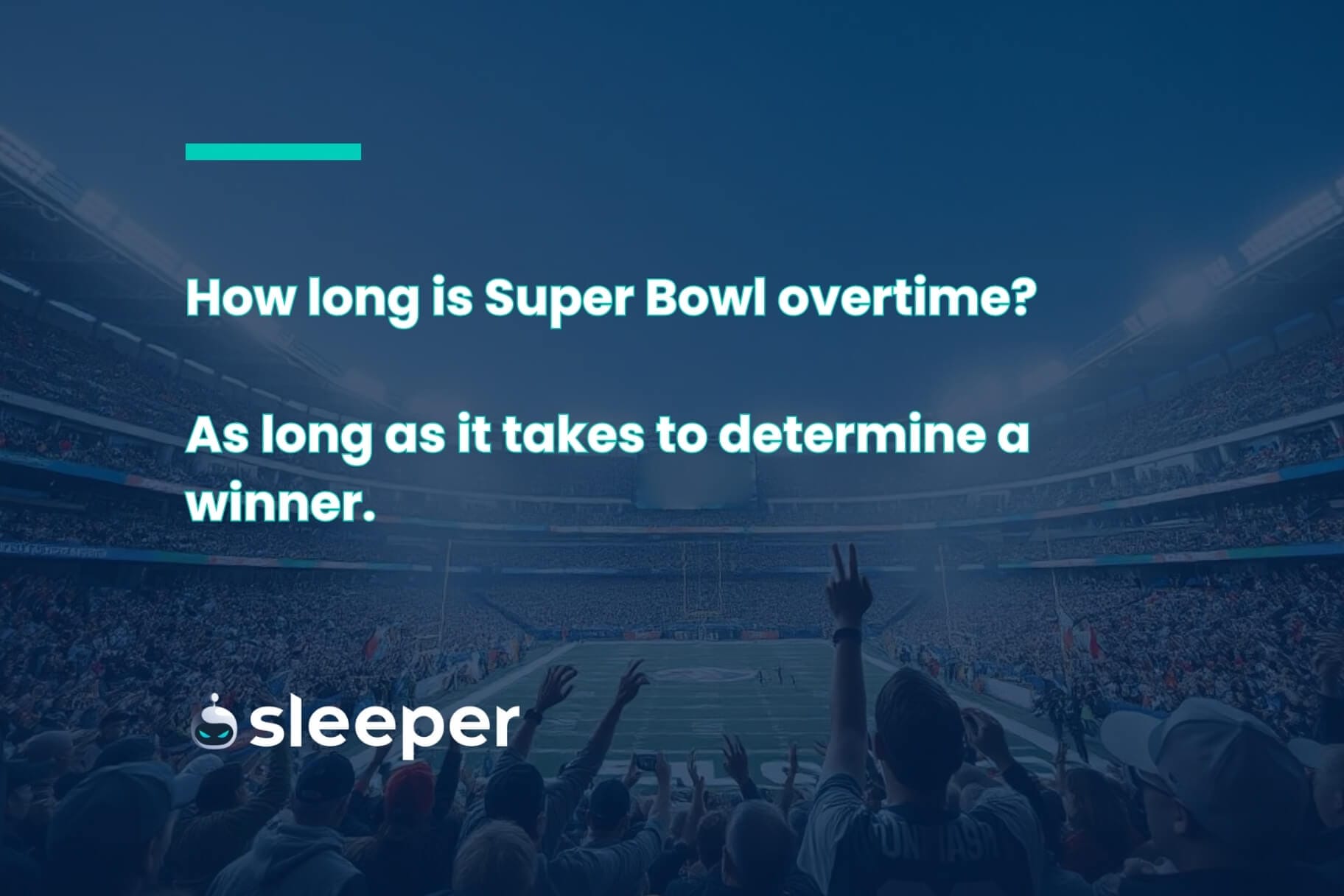Want to gain an edge in fantasy football if the Super Bowl goes to overtime? Read our handy guide to Super Bowl overtime rules and how they impact fantasy contests.

The Super Bowl is the biggest game of the year in football, with players looking to secure their legacies and fans looking for one last thrill before the offseason arrives. In the off chance the big game goes to overtime, the intensity surrounding the scene ramps up even further, as the biggest moments that ultimately decide the game will be remembered forever. But how does Super Bowl overtime work?
In this breakdown of how Super Bowl overtime works, we’ll explain the rules for overtime in the final game of the NFL season (as of 2025) and how these rules differ from the regular season. We’ll also cover how those overtime rules impact fantasy football from a strategic standpoint, so you can maximize your chances of victory on the most exciting day of the year for football fans.
How Does Overtime Work in the NFL Regular Season?
Before we go over the Super Bowl overtime rules, here’s a refresher on NFL overtime rules during the regular season. This will serve to illustrate the differences between the overtime rules in the regular season and in the Super Bowl, differences that underscore the significance of the Super Bowl compared to regular season games.
10-Minute Period, Ties Are Possible
In the NFL regular season, overtime consists of one overtime period that is a maximum of 10 minutes in length. Games can be decided prior to the expiration of all 10 minutes, as outlined in the sudden death rules we will get to shortly. But if the teams remain tied at the end of the 10-minute overtime period, the game ends in a tie, with both teams avoiding a loss but missing out on a win that could be crucial to their postseason aspirations.
Sudden Death Rules
NFL regular season games can end in overtime prior to the expiration of 10 minutes of game time if the following scenarios play out:
- If the team that possesses the ball first in overtime scores a touchdown on the opening possession of the extra period
- If the first team to possess the ball fails to score any points on their drive, the second team to possess the ball can end the game with any score (Touchdown, Field Goal, Safety)
- If the first team to possess the ball scores a field goal but not a touchdown, the second team to get the ball can win by scoring a TD. If the second team kicks a field goal in this scenario, the game would remain tied and play continues.
- If both teams score an equal amount on their first overtime possession, the next team to score wins the game.
Two Timeouts Each
In overtime during the regular season, both teams receive two timeouts to use over the course of the 10-minute period. There is also a two-minute warning in overtime in the event the game is not decided in the first eight minutes of the period, giving both teams an additional clock stoppage.
No PATs
There are no PAT attempts in overtime in the NFL. Any touchdown is guaranteed to end the game, rendering extra points or two-point conversions unnecessary. Instead, teams can simply celebrate a regular-season victory as soon as they score a touchdown in overtime.
How Does Super Bowl Overtime Work?

In the Super Bowl, things work differently. Below are the most notable differences between overtime in the regular season and when the lights are the brightest during the big show.
No Ties Allowed
The most obvious difference between regular season OT and that of the Super Bowl is the fact that there are no ties. As entertaining as it would be to see the social media reactions to two teams sharing the Lombardi Trophy after being unable to break a tie in overtime, there can only be one champion each NFL season. Therefore, the answer to the question “how long is Super Bowl overtime” is “as long as it takes to determine a winner.”
Each Team Must Possess the Ball
The most significant of the Super Bowl overtime rules is that each team is guaranteed to possess the football in overtime. In the regular season, this is not the case, as games end if the first team to get the ball scores a touchdown. But in the Super Bowl, the second team will get a possession even if the first team finds the end zone to begin the period.
This means that PATs are back in play in Super Bowl overtime, as teams can elect to go for one or two points after a TD, decisions that will impact the subsequent strategies of their opponent.
Multiple Overtime Periods Are Possible
According to the NFL Superbowl overtime rules, each overtime period is 15 minutes, as opposed to 10 minutes during the regular season. If a winner is not determined after a 15-minute period, another 15-minute overtime period will begin. These overtime periods will be played as halves, meaning timeouts reset after every two periods, and the team that elected to possess the ball first in overtime will kick off at the start of the third overtime period. While it’s improbable that we will ever see a Super Bowl game reach a third overtime…ya never know.
Three Timeouts Per Half
Unlike the regular season, where teams get two timeouts for a 10-minute overtime period, teams receive three timeouts for every two overtime periods in the Super Bowl. This is the same as the timeout rules during regulation. There will be a two-minute warning in even-numbered overtime periods, just as there is in the second and fourth quarters of regulation.
What Were the Old Overtime Rules for the Super Bowl?
Super Bowl overtime rules have evolved since the first Super Bowl overtime game, which was Super Bowl LI between the New England Patriots and Atlanta Falcons. Here are the most significant changes from the old overtime rules in the Super Bowl and the current rules.
Previous Sudden Death Rules
Previous Super Bowls (before the 2021 season) followed sudden death rules similar to the current rules in the regular season. If the first team to possess the football scored a touchdown, the game would be over and that team would be NFL champs. If the first team to possess the football kicked a field goal or failed to score, the second team to possess the ball would win with a touchdown, lose if they failed to kick a matching field goal, or the game would continue with sudden death after equal scoring from both sides.
Possession Not Guaranteed
With those Super Bowl rules for overtime, a possession was not guaranteed for both teams, which generated criticism after the 2018 game in which the Patriots marched down the field for a score and the Falcons did not have a chance to respond. Under the NFL’s new postseason overtime rules, that criticism has been addressed, as both teams now have a chance to score and control their own fate offensively.
See also: NFL Teams Still Chasing a Lombardi Trophy
How Do Super Bowl Overtime Rules Impact Fantasy Football?
The new Super Bowl rules surrounding overtime games may not come into play often. But in the event they do, they can have a huge impact on DFS and playoff fantasy football scoring.
More Scoring Chances
The biggest impact overtime in the Super Bowl will have is by creating the potential for more scoring. This is especially relevant to daily fantasy sports where participants need players to rack up yards, catches, TDs and other stats. With both teams getting an opportunity to possess the ball in overtime, there is potential upside for one or both teams to add statistical production to their tally, which can be the difference between a winning fantasy pick or ending the season in failure.
Rewards Picking Clutch Players
When it comes to how to play fantasy football, whether or not a player possesses the clutch gene tends not to be a huge factor in player selection. But with the current Super Bowl overtime rules, picking clutch players to perform well on the biggest stage can pay off. For example, Patrick Mahomes is the only QB to throw a touchdown pass in Super Bowl overtime history. Picking such a clutch player came with rewards.
Potential For All-or-Nothing Approach
While traditional fantasy leagues are already decided long before the Super Bowl, playoff fantasy league races may still be heated entering the big game. When a Super Bowl goes to overtime, the result will not only determine a Super Bowl champion, but could also determine the outcome of fantasy contests as well. Whether you’re utilizing a handcuff strategy or picking purely based on individual statistical output, overtime provides the opportunity for one side in the game to pull away from the other from a fantasy standpoint, which should be considered when assembling your playoff roster.

Super Bowl Overtime FAQ
Can the Super Bowl end in a tie?
No, the Super Bowl cannot end in a tie. Instead, teams will play 15-minute overtime periods in succession until a winner is declared per the rules described above.
How many Super Bowls have gone to overtime?
There have been two Super Bowls to go to overtime. The first was Super Bowl LI in 2018, the famous “28-3” game in which the New England Patriots came back from 25 points down to defeat the Atlanta Falcons. The second overtime was Super Bowl LVIII in 2024, in which the Kansas City Chiefs beat the San Francisco 49ers.
Does a touchdown end the Super Bowl in overtime?
While previous Super Bowl overtime rules guaranteed that an overtime touchdown would end the game, current overtime rules do not. Both teams are granted an opportunity to possess the football, meaning a touchdown on the first possession of overtime does not end the game.
How many timeouts do teams get in Super Bowl overtime?
Both teams get three timeouts for every two overtime periods in the Super Bowl. There is also a two-minute warning in the second and fourth overtime periods, should the game go that far.
What happens if the game is tied after one Super Bowl overtime period?
According to Super Bowl overtime rules, the game continues if the game is tied after one overtime period. There will be 15-minute overtime periods played one after the other until one team wins the game.
Is there a second halftime show after two Super Bowl overtime periods?
As fun as it would be to see a second concert during the Super Bowl, overtime rules for the Super Bowl do not allow for an overtime halftime show. Instead, teams will get a two-minute intermission between overtime periods.
Take Your Fantasy Football Performance to the Next Level
No matter what happens in the Super Bowl, understanding the rules for overtime may be important to fantasy football success. Leverage your knowledge of the game to achieve victory in Super Bowl DFS contests with Sleeper Picks. Download the Sleeper app or create an account to be ready to dominate when Super Bowl Sunday rolls around.




